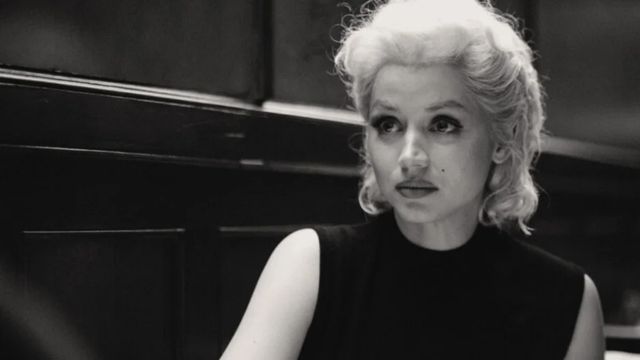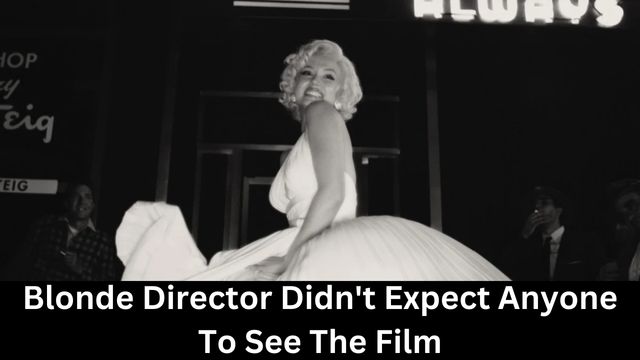Blonde Director Didn’t Expect Anyone to See the Film
The Marylin Monroe NC-17-rated feature “Blonde” has been a contentious affair both on and off-screen, with the highly dramatized, loosely biographical film receiving significant backlash from both fans and critics (via Cosmopolitan).
Despite all of the negative buzz surrounding the film, what surprised director Andrew Dominick more than any of the contentious buzz was the fact that people actually watched it.
READ MORE:-Every Unmasked Jason Voorhees Appears in Friday The 13th Films!
The premise of “Blonde” is an interpretation of the facts rather than being historically accurate isn’t the only thing that got everyone so worked up. There were several elements in the Netflix film that enraged fans, organizations, and other prominent industry figures.
The depictions of mental illness, abortion, and abuse were heavily criticized, and the film’s 32% audience rating on Rotten Tomatoes demonstrates that most people didn’t like Dominik’s take on the Hollywood legend’s life.

The critics’ score isn’t much better, and the film’s reviews are a bit mixed, with many praising Ana de Armas’s performance as Monroe.
It also doesn’t help that the director didn’t know much about Monroe beforehand. Despite this, it appears that many people have seen “Blonde,” which is not what Dominik expected.
‘Blonde’ Director Says His Movie Didn’t Exploit Marilyn Monroe: ‘she’s Dead’
Andrew Dominik has no qualms about making one of the year’s most divisive films.
During a weekend appearance at the Red Sea International Film Festival in Saudi Arabia, the Australian filmmaker addressed the heated backlash that followed the fall release of “Blonde,” his Marilyn Monroe biopic.
READ MORE:-Nicole Kidman Net Worth: The Salary Breakdown Of Nicole Kidman For Each Film Is So Much
Dominik was “really pleased” that the film’s treatment of Monroe had “outraged so many people,” despite the fact that most American viewers “hated” it.
“Now we’re living in a time when it’s important to present women as empowered, and they want to reinvent Marilyn Monroe as an empowered woman,” he told The Hollywood Reporter. “That’s what they want to see, and if you don’t show them that, it irritates them.”
“Blonde,” based on Joyce Carol Oates‘ 2000 novel, has an NC-17 rating and is said to be a graphic depiction of Monroe’s life, including miscarriages, sexual assault, and substance abuse.

‘Blonde’ Director Thinks It Tanked Because Americans Were Offended. Maybe It’s Just a Bad Movie
Blonde, Andrew Dominik’s brutal fictionalized biography of Marilyn Monroe, received mostly negative reviews from critics and audiences, including myself.
Unfortunately, Dominik learned the wrong lesson from the film’s poor box office performance. Dominik claimed over the weekend at Saudi Arabia’s Red Sea International Film Festival that Blonde had “outraged so many people.” He reasoned that American audiences would not want to see a film that used “the iconography of [Monroe’s] life to serve something else.”
READ MORE:-The Idol Hbo Release Date: Cast, Release, Trailer, Filming and Premiere
“We live in an era when it is important to portray women as empowered, and [Americans] want to reinvent Marilyn Monroe as an empowered woman… “If you don’t show them that, it irritates them,” he explained.
Dominik, no. I’m not upset because I wasn’t seeing an empowered woman on screen, but rather because I spent an evening watching a montage movie of fantasy rape scenes with not a single thought about Monroe’s life outside of a string of abuses.
If anyone is offended by this film, it’s because some of us wasted nearly three hours of our lives watching a CGI fetus have not one, not two, but three full beauty close-up shots and at least two conversations with Marilyn Monroe (there might have been a third but I blacked it out, to be honest). I also found it absurd that I was expected to think, “Wow, this is a man who has done his research on a famous woman,” while watching the stars in the sky turn into cartoon sperm.

Obviously, I can’t help but recall how many times I wrote or performed something less than stellar (or even passable) and consoled myself with the thought that the audience (cowards) couldn’t understand real art.
It’s an easy way to dismiss and dismiss criticism—especially when you can just say the words “woke” or “cancel culture” and half the world will nod in sympathy with your plight.



Comments are closed.